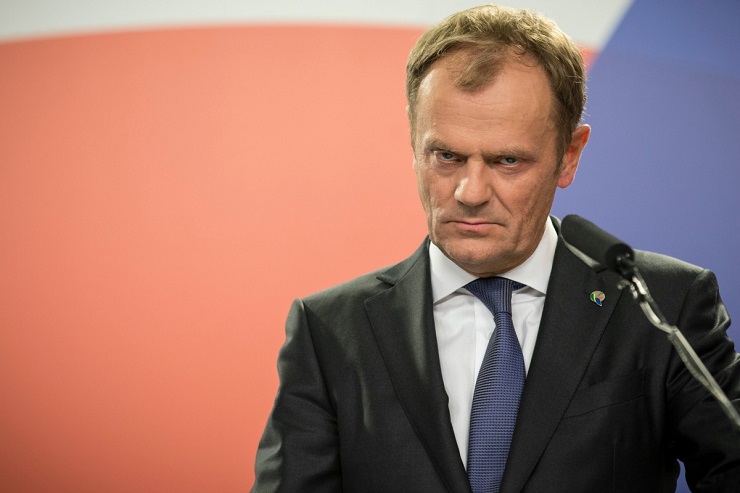Lately, the ties between the partners on two different shores of the Atlantic, namely the US and the EU have been getting increasingly tense due to the overall unpredictability of the sitting American president.
It’s recently been noted by Klaus Brinkbäumer in his opinion piece for Der Spiegel that the West as we knew it has ceased to exist, as today’s EU relations with the US can not be defined as friendship, as a matter of fact they can hardly be described as a partnership.
And he’s not the only one to support this premise. Last month, the sitting president of the European Council, Donald Tusk used his Twitter account to rebuke Washington’s recent decisions, noting that:
Looking at latest decisions of DonaldTrump someone could even think: with friends like that who needs enemies. But frankly, EU should be grateful. Thanks to him we got rid of all illusions. We realize that if you need a helping hand, you will find one at the end of your arm.
Such gloomy remarks started appearing a year into Trump’s term. What can one expect to happen next? Both politicians and ordinary citizens of Europe find themselves equally incapable of providing an answer.
It’s been noted that the EU has already taken a tough stance on Trump’s tariffs, with the European Commission president Jean-Claude Juncker stating that:
We will not negotiate with the sword of Damocles hanging over our heads.
At a summit in Sofia, European leading political figures agreed on a similarly intractable position on preserving the nuclear deal with Iran that the US is leaving on its own accord. Now the EU is activating a so-called blocking statute to protect European companies from American sanctions introduced against them for their determination to keep doing business with Iran.
In addition to these conflicts, the U.S. Has threatened sanctions on European companies involved with Nord Stream 2, including powerful multinationals such as Royal Dutch Shell, Austria’s OMV, France’s Engie and Germany’s Uniper and Wintershall.
According to Bloomberg, now even the EU officials and national leaders who have no particular love for Nord Stream 2 are on the side of Germany. However, the Trump administration seems happy to multiply disputes with European allies, expecting them to cave on all contentious issues. But even though the EU has often appeared weak and ineffectual, it can also be stubborn, and the more pressure Trump brings to bear, the more it will push back.
Of what you can be international agreements wit the US, if it can withdraw from them at any given moment, like Washington did with the agreement on the Iranian nuclear program, demands Le Figaro. The media source can’t seem to understand why the whole European continent should be held hostage of the ever changing masters of the White House? The solemn speech delivered by the US president during the announcement of Washington’s withdrawal from the JCPOA and the restoration of the embargo against Iran would remain forever in the history of international diplomacy for two reasons: due an unprecedented number of factual inaccuracies and the renunciation of the signatures of America’s elected officials. According to the same French media source, with the onset of such the American dictate, that is deaf to European pleas, how much independence is there left for the EU to enjoy? There’s little doubt that this is the true test of the European Union political determination, and it seems that European state will lose the reason for their existence should Brussels cave in.
In yet another article Le Figaro says that the whole situation was made deliberately humiliating for Europe, with Trump rejecting any proposals to save the agreement, made both by Paris and Vienna. It’s now clear that Donald Trump has triggered an unprecedentedly difficult transatlantic crisis. The statement of fact is cruel. The United States, which has been strengthening the head of Western world since 1945 is now splitting it in two by withdrawing from the agreement on the Trans-Pacific Strategic Economic Partnership, introducing trade sanctions against Beijing, then proceeding with the murder of the Iranian nuclear deal in cold blood, turning its back on the bilateral talks with North Korea, while launch strikes against Damascus.
It is clear that Europe is at a crossroads and faces the need to choose the path, notes El Mundo, while its inability to create a single federal center prompted Europe to turn to the East.
Therefore, it is not surprising that on May 18 the European Commission adopted the first package of measures to protect EU companies in Iran from US sanctions, providing legal grounds for outlawing American sanction on the territory of the EU.
While Trump has been urging European states to hand over a total of 2% of their GDP to NATO, as they happen to be members of this obsolete military alliance, Brusels has come to the idea of creating its own military organization called the European Intervention Initiative. But this is clearly not the last decision that Europe in the aftermath of its bad break up with Washington, aimed at protecting local states from the unpredictable policies of the White House.
Grete Mautner is an independent researcher and journalist from Germany, exclusively for the online magazine “New Eastern Outlook.”

